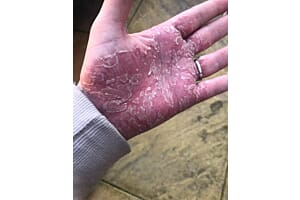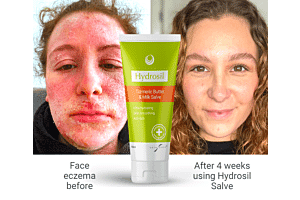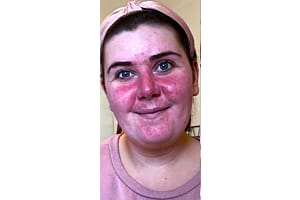Red, itchy, dry and swollen eyelids are very common but the causes are varied, ranging form eyelid eczema to cold sores. The skin surrounding the eye is so sensitive, that often other health conditions will also manifest themselves in the skin around the eye.
The key is to identifying the correct cause of the symptoms and treat it with the correct product. If you treat irritated or swollen eyes or eyelids with the wrong product, it can make them a lot worse.
Here are some common causes of red, swollen or itchy eye lids;
Eyelid Eczema
By far the most common reason for red, dry and itchy eye lids is eye lid eczema. Due to the skin around the eye being so sensitive, even if there is no eczema elsewhere on the body, eczema can occur just around the eyes.
[quote] Eye lids eczema is usually accompanied by flaking and drying of the skin to the edge and under the eye too as well as flaking and dryness of the eyebrows.[/quote]
The actual eye itself is usually not effected, although often people with eye lid eczema have red eye due to eth constant rubbing and itching of the skin around their eyes.
How to treat Eye Lid Eczema
Prescription corticosteroid eye creams can be prescribed for eye lid eczema, however steroids have been associated with side effects such as increased inner eye pressure (intraocular pressure) leading to glaucoma and damage to optic nerve. Steroids also have been known to cause the eye's natural lens to become cloudy, producing cataracts.
Non-steroid alternatives for eye eczema are rare however Skin Shop’s Dry Eye Gel contains natural plant steroids to help bring down redness and prevent itching without the side effects of steroids. Unlike steroids it can be used as often as necessary.
Make Up Eye Allergies
A very common cause for eye lid allergies is contact dermatitis from make up. Many cosmetics contain irritants (especially those in darker colours and with glitters in). [quote]Mascara can also cause inflammation of the eye lid as it’s easy for bacteria to get into mascara bottles and multiply due to the damp and closed environment of the mascara container.[/quote]
How to treat/prevent make up eye allergies
Replace mascara regularly, and avoid dark or glittery eye shadows. Cleanse all make up off before bed with a non-chemical non-perfumed cream cleanser for very sensitive skin such a Skin Shop’s KALME Cream Cleanser. Do not use perfumed or chemical eye creams around the eye area. Instead use non-perfumed creams for very sensitive skin.
Try applying Skin Shop’sKALME Undercoat around the eyes before applying make up. KALME Undercoat is a chemical-free light moisturising cream that can be used around the eye that contains an ingredient that can decreased skin sensitivity by up to 70% and can help protect very sensitive skin from contact allergies.
Blepharitis
Blepharitis is often mistake for eye eczema but in fact is a specific eye condition that causes inflammation and infection of the eyelids, eyelid margins, eye lashes, and meibomian glands. It occurs when dirt leads to bacteria in the eyelids. Symptoms include itching, redness and burning of eth eyelids and is sometimes accompanied by a sensitivity to light. Eye allergies can also accompany blepharitis.
How to treat Blepharitis
Steroids are often not effective for this condition and there is no specific treatment for it.
Try Skin Shop’s Dry Eye Gel to help bring down the inflammation and itching on the eye lids. Regularly cleanse eye lids and rims with clean warm water to try and clear any pore blockages. Use natural or OTC eye lubricants if the eye itself is dry. Use antibiotic eye drops if the eye becomes infected. Research also shows that Omega 3 long chain fatty acids help with this condition. Flaxseed Oil is a rich source of Omega 3.
Hayfever
Hayfever can cause the eye lids to become red and swollen. In addition the constant watering of the eyes with hayfever can cause the skin around the eye to become very dry and irritated. Hayfever also makes the actual eye itchy and so frequent rubbing of the skin around the eyes can also cause irritation and dryness.
Howe to treat hayfever
Antihistamines are the most common way to treat hayfever but try to avoid those containing Diphenhydramine, which can dry the eyes out and make itching worse. [quote]Eye drops and tablets are always prescribed for hayfever but few doctors recommend products to help soothe the irritated and itchy skin around the eyes.[/quote]
Skin Shop’s Dry Eye Gel is excellent for dry and itchy skin around hay fever eyes. Or try placing used cold green tea tea bags over eyes while sleeping as green tea has a strong anti-inflammatory action.
Contact lens solutions
Preservatives in contact lens solutions (in particular Thimerosal) can cause contact dermatitis of the skin around the eye and on the eye lids, causing redness, itching and dryness.
How to treat/prevent contact lens solution eye allergies
Rinse off with warm clean water any contact lens solution that runs over the skin around the eye immediately after putting contact lenses in. Apply KALME Undercoat to skin around the eye a few minutes before putting contact lenses in to help de-sensitise skin.
Shampoos
Some eye skin allergies are caused by hair washing products and shampoos. Most shampoos contain harsh preservatives and are highly perfumed. [quote]When washing shampoo typically runs over the face and across the eyes and can cause mild allergic skin reactions in the delicate skin around the eyes and on the eye lids. [/quote] In particular anti-dandruff shampoos that contain strong anti-fungal agents are common triggers for skin allergic reactions.
How to treat/prevent shampoo eye allergies
Ideally switch to a shampoo & conditioner that is chemical-free and suitable for sensitive or allergy-prone skin. Try Skin Shop’s Dry Scalp Shampoo & Conditioner. Alternatively wash hair separately with hand held shower head making sure little or no shampoo runs over the face or wear swimming goggles in the shower when washing hair to try and protect eye area from exposure to shampoo suds.
Antihistamines
Antihistamines (in particular Diphenhydramine) can make eyes dry and itchy due to reduced tear production. This in turn causes more frequent rubbing and blinking of the eye which can lead to skin irritation and itchiness around the eyes.
How to treat/avoid antihistamine eye allergies
Avoid antihistamines with Diphenhydramine in. However if antihistamines are necessary, try and reduce irritation of skin surrounding the eye caused by frequent rubbing of dry eyes. Try Skin Shop’s Dry Eye Gel to reduce surrounding irritation and use lubricating eye drops for the dryness of the eye.
Conjunctivitis
Conjunctivitis causes both redness of the actual eye itself and itching and redness of the skin around the eye and on the eye lids. It can be caused by either bacteria or viruses. In bacterial infections, the eyes are often bright red and the eyelids stick together, especially in the morning. [quote] Swelling of the eyelids is common due to localised bacterial inflammation.[/quote] A discoloured mucous discharge is often seen. Viral conjunctivitis causes slight redness of the eyes and a glassy appearance from tearing and often causes dryness and itching around the eye due to constant weeping of tears form the eye.
How to treat/avoid conjunctivitis
Conjunctivitis is highly contagious so keep away from people with it. Usually antibiotic eye drops are prescribed. However if the skin around the eye is also irritated and itchy, try Skin Shop’s Dry Eye Gel.
Coldsores
[quote]Although most people assume cold sores only effect the lips, in fact the Herpes virus that causes cold sores can also effect the eyes. [/quote] Apart from cold sores, the Herpes virus also causes chickenpox and shingles - all three can affect the eye and cause redness and swelling of the eye lids as well as itchiness around the eye. So if you have a cold sore and sore eyes, the two may be related.
How to treat herpes eye irritation
Liquorice contains anti-viral agents that are very effective against the Herpes virus. Try drinking liquorice tea. If the skin around the eye is irritated or itchy, try Skin Shop’s Liquorice Balm on the skin around the eye and on the eye lids.
Helpful tips to identify different eye conditions;
- If your eye lids are red and flaky and dry and you have flakes in your eyebrows too, it’s most likely to be eye eczema
- If your eye itches and is "milky" red, it is most likely an eye allergy.
- If you eye burns or stings, it is probably dry eye.
- If your eye lids stick in the morning and is red, it is usually a bacterial or viral infection







